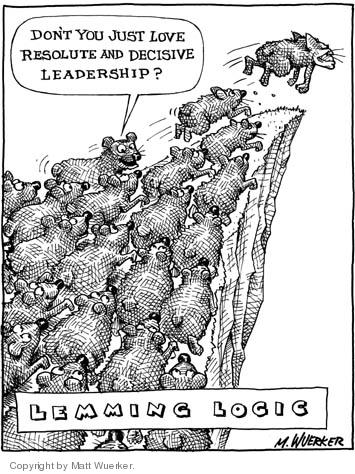I really liked George Lakoff's theory on diction and the connotation of words. I had not really thought about the connections some people might make when certain words or phrases are used in public speaking. I don't feel that I took these things at face value, but I did not make all the possible connections that Lakoff suggests exist beneath the glossy veneer of slippery speech. For example, his mention of George Bush's "permission slip" speech. When I read this, I did not think of the phrase making the United States the "adult" country and all others the inferior children which must be supervised and disciplined. I at first only thought of the United States being a supreme power, of taking control and directing others as its government sees fit. To suggest that the United States has an adult-child relationship with the rest of the world brings so many other ideas and connections to mind than simply power. I really like how Lakoff looks at these issues through word usage and speech framing, at how these ideas are almost subliminally conveyed through very carefully chosen words.
 (I think this picture works for the point I am trying to make on several different levels.
(I think this picture works for the point I am trying to make on several different levels.Honestly, not only are most of our leaders liars,
the language they use is as well. There is never just one simple way to interpret something they say.)
This perspective makes language take on a new tangency, almost. It requires that the audience be well-read, at least in terms of detecting all possible meanings and associations of the words chosen. An uneducated audience will still not have any problems dissecting what is being said, but they will not be able to understand the full implications of what exactly is meant. I think it is interesting that public discourse can be framed in this way, tailored to one particular audience instead of the general population. To me, this suggests that when this type of language is used, it is definitely a means of control.
Framing things for a particular group allows the speaker to have control over those who do not understand completely, and thus they will most likely go blindly along with whatever is being said or done.
Kind of like Ralph here:
 Yeah. Just like that.
Yeah. Just like that.I do like magic!
Apathy is the worst form of evil in the world.
 Walter Lippman's The Disenchanted Man discusses the reasons for indifference in regards to politics and public matters, as well as how persuasion functions and affects the targeted audience. However, I find it interesting that although people can not be interested in what is happening, an approach to emotional appeal is taken when attempting to persuade. Lippman states that:
Walter Lippman's The Disenchanted Man discusses the reasons for indifference in regards to politics and public matters, as well as how persuasion functions and affects the targeted audience. However, I find it interesting that although people can not be interested in what is happening, an approach to emotional appeal is taken when attempting to persuade. Lippman states that:"Because feelings are much less specific than ideas, and yet more poignant, the leader is able to make a homogeneous will out of a heterogeneous mass of desires. The process, therefore, by which general opinions are brought to cooperation consists of an intensification of feeling and a degradation of significance."
I find it interesting that emotions are manipulated in order to appeal to a higher purpose, and in so doing only a few choices are ultimately made possible. I feel like this is exactly what President Bush did after September 11 -- his speeches centered more around the significance of patriotism and unification rather than the tragedy of what had happened, although it was (in my opinion) poorly and cheaply addressed and made into a pitiful excuse for war. By approaching the topic in this manner, Bush created a rallying cry from the masses that excused the war he was pursuing in the Middle East. Later, it was discovered he went for purposes other than what he stated, which have since become significant and hard to ignore. Since he focused on the emotions attached to the attacks, rather than what the meaning was behind the event, he created the support he wanted for his administration and for the "war on terrorism." (Which is another example of Lakoff's style of framing -- 'war' alone has horrible connotations, but declaring war on terrorism suggests an almost heroic purpose.)
No comments:
Post a Comment